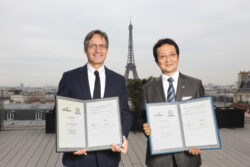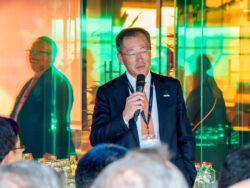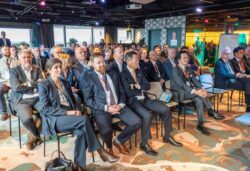Yusen Logistics Group Completes Acquisition of Walden Health, Strengthening Global Healthcare Logistics Capabilities
Yusen Logistics Global Management Co., Ltd. (CEO: Hiroki Harada) is pleased to announce that Yusen Logistics (Europe) B.V. (Managing Director: Minoru Futonaka), an overseas subsidiary of Yusen Logistics Group, has completed the acquisition of the Walden Group subsidiaries Movianto, Eurotranspharma, Transpharma International, and Walden Digital, effective December 10, 2025.
This transformative and strategic acquisition further reinforces Yusen Logistics’ leadership in the European healthcare logistics sector and demonstrates our unwavering commitment to delivering best-in-class transportation and logistics solutions for the healthcare industry.

“Today marks an important step forward for Yusen Logistics as we officially welcome our new colleagues from Walden Health into our organization. This integration strengthens our position in the healthcare logistics sector and reflects our commitment to delivering best-in-class solutions for customers across Europe and beyond. By combining Walden Health’s expertise with Yusen Logistics global network, we will be able to deliver a healthcare logistics platform that is ‘second to none’ — ensuring quality, reliability, and innovation throughout the supply chain. I am confident that this strong start will accelerate our growth and support the ambitious objectives of our new mid-term plan starting April 2026. Together, we will set new benchmarks for excellence in healthcare logistics.” said Hiroki Harada, CEO of Yusen Logistics Global Management Co., Ltd.
Customer and Industry Centric
The acquisition will harness the combined expertise, innovation, and extensive networks of the acquired companies and Yusen Logistics to provide our customers and the healthcare sector with industry leading global solutions and seamless delivery across Europe and beyond.
Movianto: Delivers end-to-end logistics solutions for pharmaceutical, biotechnology, medical device, and diagnostic sectors, with comprehensive services including transport, warehousing, and value-added services.
Eurotranspharma: Healthcare transportation primarily focused on B2B and last-mile distribution services for temperature-controlled healthcare products.
Transpharma International: Delivers GDP⁽*⁾-compliant logistics, end-to-end supply chain solutions including control tower for the pharmaceutical and healthcare sectors, offering comprehensive road, air, sea transport, customs and trade services.
Walden Digital: Innovator in self-developed Transport Management System (TMS) and Warehouse Management System (WMS) solutions, offering client-facing Software as a Service (SaaS) along with integrated tracking and monitoring.
All entities will operate as part of the Yusen Logistics Healthcare network, strengthening our healthcare sector capabilities, as wholly owned subsidiaries of Yusen Logistics (Europe)B.V. ― creating a dedicated healthcare platform that connects end-to-end logistics services and supply chain solutions including international freight forwarding, warehousing, transportation, last-mile delivery, as well as control tower and digital solutions.


Alignment with Yusen Logistics’ Growth Strategy and Vision
This acquisition underscores our commitment to the strategic priorities that will be outlined in our upcoming mid-term plan for FY2026-FY2028, including targeted investments in high-growth areas such as healthcare logistics. These initiatives will enable Yusen Logistics to deliver resilient, compliant, and sustainable logistics solutions worldwide.
“Completing this acquisition is a pivotal moment for Yusen Logistics in Europe. By combining our long-standing regional presence with the specialized expertise of these healthcare professionals, we are strengthening our ability to deliver comprehensive, tailored solutions across the entire supply chain. This integration not only expands our footprint but also reinforces our commitment to supporting customers with world-class healthcare logistics. I am very grateful to all colleagues in Europe and worldwide whose dedication and hard work made this achievement possible.” said Minoru Futonaka, Managing Director of Yusen Logistics (Europe) B.V.

“With Yusen Logistics Healthcare network, we are entering an exciting new chapter by creating a dedicated healthcare platform that connects warehousing, transportation, last-mile delivery, and digital solutions—delivering end-to-end excellence. Our shared mission is clear: protecting product quality and ensuring that essential medicines and healthcare products reach patients safely and on time. I am proud of the remarkable progress Walden Health has achieved and look forward to shaping an even stronger future together with Yusen Logistics.” stated Bruno Jacques, Deputy Managing Director, Yusen Logistics (Europe) B.V. and CEO, Yusen Logistics Healthcare (Europe).


The Welcoming Ceremony on December 18 in Antwerp, Belgium
⁽*⁾ Good Distribution Practice
Contact
For further information please contact at
Yusen Logistics Global Management Co., Ltd.
ghqcomms@jp.yusen-logistics.com
Yusen Logistics (Europe) B.V.
communication@eu.yusen-logistics.com